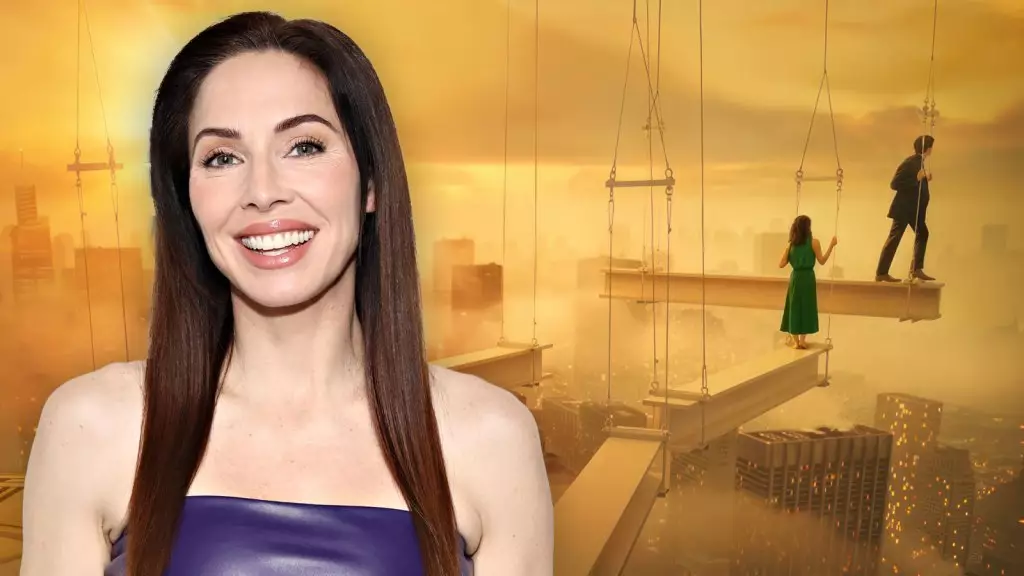Auditions are often viewed as both a doorway to opportunity and a gauntlet of anxiety, especially for aspiring actors. Comedian Whitney Cummings recently opened up about a particularly harrowing audition experience she faced for Francis Ford Coppola’s ambitious science fiction project, *Megalopolis*. Her account brings to light not only the vulnerability that performers endure but also the unpredictable nature of the audition process in Hollywood. Through her reflection, we witness the intersection of preparation and spontaneity, and how sometimes, talent may be overshadowed by circumstance and confusion.
Cummings described the audition as “humiliating,” a sentiment that resonates with many in the industry who have faced similar emotional hurdles. This level of discomfort can be detrimental, undermining even the most practiced of performers. Cummings highlighted the disconcerting atmosphere that enveloped the audition room, where instead of the encouraging buzz typical of auditions, silence prevailed—an unsettling environment that can derail focus and confidence.
The Weight of Expectations
For Cummings, the weeks leading up to the audition were filled with dedicated preparation. She committed significant time to memorize lines, with the expectation that she would engage in a traditional audition format. However, the encounter with Coppola quickly morphed into something entirely different. The renowned director opted for an improvisational approach, tossing unexpected prompts at her—requests that seemed designed to push the boundaries of creativity but instead left Cummings feeling unmoored.
The scenarios he posed were not only challenging but also bizarre, particularly the requirement to say goodbye to a son going off to war in an English accent, followed by a confrontation with a husband in an Australian accent. It is during these moments that one realizes the fine line between artistic freedom and creative chaos. Cummings amusingly compared the scene to being part of a hidden-camera prank show, leading her to question the authenticity of the experience.
As the audition progressed, a sense of bewilderment set in; Cummings admitted to “glazing over,” ultimately leading to a psychological disassociation from the moment. In the realm of performing arts, this feeling is not uncommon, particularly when one is thrust into an unexpectedly unstructured environment. When the standards of a traditional audition are stripped away, actors may find themselves grasping for relevance, a situation that can breed feelings of inadequacy and embarrassment.
Cummings’ musings on the encounter raise important questions about the role of directors and producers. Should they not recognize the psychological burdens placed upon performers? Furthermore, while improvised scenes can be a revealing window into an actor’s capabilities, they can also exacerbate the pressure, pushing performers into uncomfortable territories that may not showcase their true talents.
The fallout of this audition lingered long after the experience itself. Cummings described the director gifting her a signed copy of his new book and a bottle of his wine, an act she found profoundly demeaning considering the circumstances. Such gestures, meant to convey goodwill, can inadvertently add to the feelings of embarrassment when they follow a shaky performance. This dichotomy highlights an uncomfortable truth in the industry—the blurred lines between professional respect and humiliation.
Despite the challenges, Cummings emerged from the experience with a sharpened perspective. She learned that the capabilities of an actor extend beyond memorization and performance skills; they also include resilience in the face of unpredictable environments. Despite *Megalopolis* ultimately underperforming at the box office compared to its lofty budget, the lessons of that audition endure in Cummings’ career narrative, serving as a testament to the myriad experiences that shape an artist’s journey.
Whitney Cummings’ audition tale stands as a vibrant illustration of the trials faced by performers in Hollywood. It serves to remind aspiring artists that while preparation is essential, the unpredictability of the audition process can be equally significant in shaping their careers. Such stories of resilience, vulnerability, and growth are what make the journey of performing arts all the more compelling—and serve as a valuable lesson that every setback is an opportunity for future triumph.


Leave a Reply